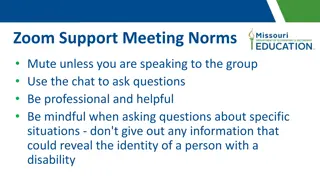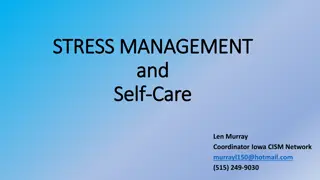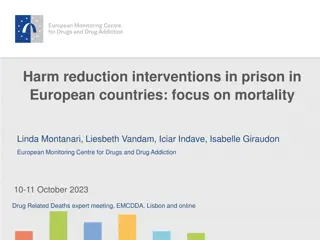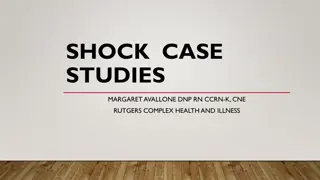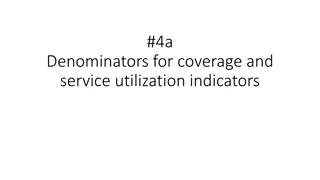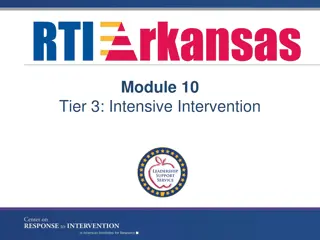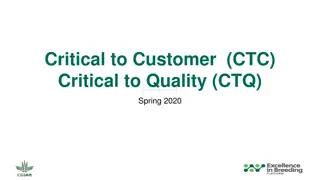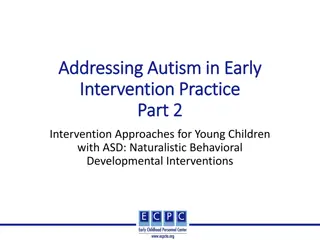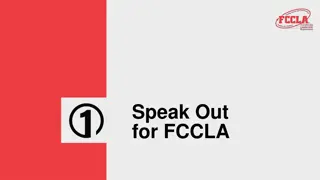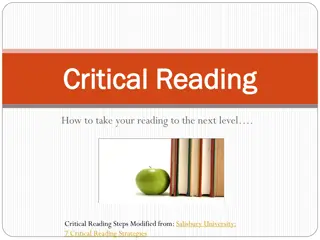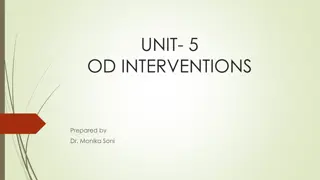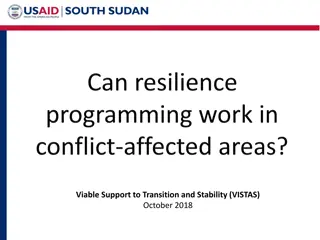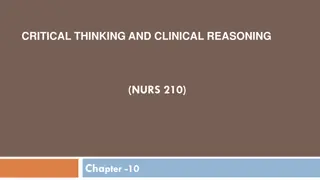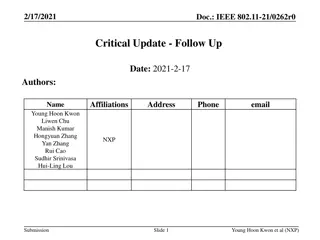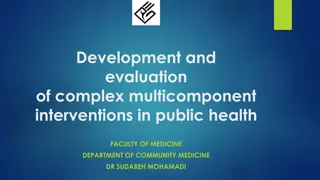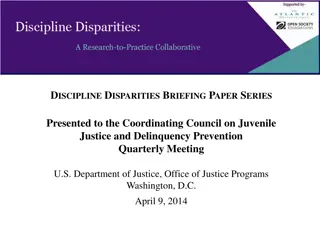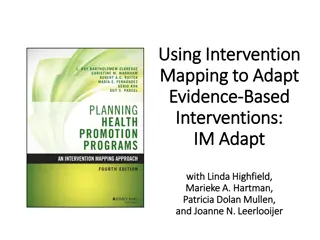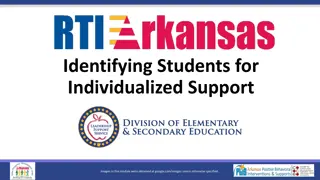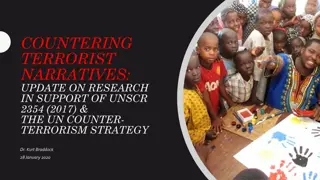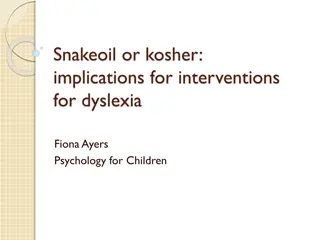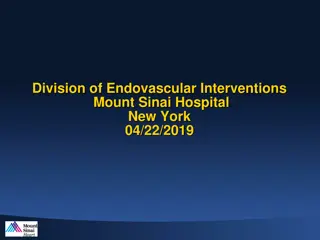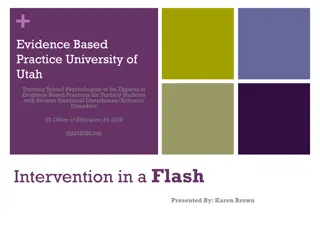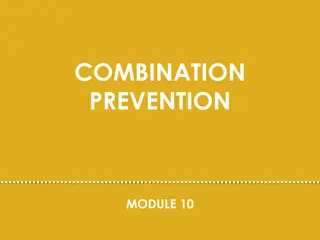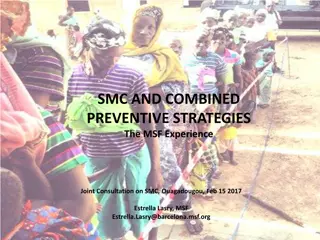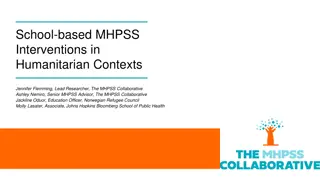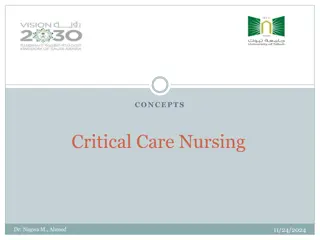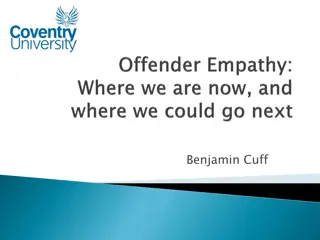Understanding Critical and Non-Critical Incidents in Incident Reporting
Critical incidents, as defined by regulations, are serious events that pose immediate risk to health, safety, or welfare. Non-critical incidents, on the other hand, are minor in nature and do not have serious consequences. Incident reports play a crucial role in documenting occurrences, identifying
0 views • 29 slides
Exploring Community Justice Interventions for Alcohol-Related Offenses
This presentation delves into the various community justice options available for individuals involved in alcohol-related offenses. It outlines the justice process post charges, community justice programs, national policies, successful examples like CPOs with alcohol treatment, challenges faced, and
1 views • 22 slides
Effective Strategies for Speech and Language Interventions in Education
Explore the crucial norms for Zoom meetings, guidelines for speech and language interventions, and the roles of speech-language pathologists in schools. Learn why these interventions are essential, focusing on providing educational relevance, cultural sensitivity, and supporting student progress wit
2 views • 40 slides
How to do Critical Analysis
Massey University provides valuable insights on critical analysis, distinguishing between description and analysis, evaluating evidence and reasons, and making strong arguments. Critical thinking involves evaluating evidence to reach informed conclusions, surpassing mere understanding. While descrip
0 views • 22 slides
Understanding Critical Incident Stress Management (CISM)
Critical Incident Stress Management (CISM) is crucial for addressing the emotional, physical, and psychological reactions to overwhelming events. This includes definitions of critical incidents, CISM teams, peer support, and crisis response teams. Learn how the International Critical Incident Stress
2 views • 25 slides
Insights on Harm Reduction Interventions in European Prisons
Explore findings on mortality rates, drug use prevalence, and interventions in European prisons. Discover the impact of drug-related deaths, including NPS use, and the effectiveness of interventions like OAT and harm reduction strategies. Learn about the challenges and opportunities in addressing dr
0 views • 15 slides
Shock Case Studies: Patient Management Scenarios and Interventions
Explore patient scenarios of hypovolemic shock post-surgery, learn key assessments, prioritize actions, recognize shock manifestations, and apply interventions. Dive into the complexities of patient care in critical situations.
0 views • 60 slides
Comprehensive Assessment of Denominators for Population Coverage and Service Utilization Indicators
This document outlines the importance of denominators in determining the percentage of the population reached by healthcare services. It covers a range of indicators for both preventive and curative services, providing insights on population projections, target populations, and specific intervention
2 views • 20 slides
Understanding Tier 3 Intensive Intervention in RTI Systems
This content delves into the critical features of Tier 3 interventions within Response to Intervention (RTI) frameworks. It covers the objectives of Tier 3 systems, designing and implementing interventions, problem-solving processes, essential components of RTI, evidence standards for interventions,
0 views • 64 slides
Understanding Critical to Customer (CTC) and Critical to Quality (CTQ)
Quality is determined by meeting customer needs. Critical to Customer (CTC) Flowdown translates these needs into Critical to Quality (CTQ) aspects. This tool helps organizations identify what is critical to meet customer expectations, serving as a communication tool and guiding improvement projects.
2 views • 10 slides
Understanding Naturalistic Developmental Behavioral Interventions for Children with ASD
This resource explores the history of autism interventions, focusing on Naturalistic Developmental Behavioral Interventions for young children with ASD. It covers theoretical approaches, specific needs met by NDBIs, examples of research-validated NDBI models, and common elements used in intervention
0 views • 53 slides
Exploring Critical Thinking in a Digital Society
Delve into the realm of critical thinking in the modern era, where information is readily available. Discover how easy access to data impacts our ability to think critically. Explore the importance of critical thinking and its application in today's society. Learn about the six-step critical thinkin
0 views • 32 slides
Unlocking Critical Reading Skills: Strategies and Techniques
Enhance your reading comprehension through critical reading practices. Understand the definition of critical reading, its importance in the reading process, and learn practical steps to become a critical reader. Discover how critical reading fits into the C.A.R.E. model and the benefits it brings to
0 views • 26 slides
Understanding Organizational Development Interventions
Organizational Development (OD) Interventions play a crucial role in enhancing organizational functioning and aiding managers in navigating team dynamics. These interventions encompass various techniques, including behavioral and non-behavioral approaches such as Sensitivity Training, Transactional
4 views • 17 slides
Evaluation of Evidence for Road Safety Policies in Canada
The study critically appraises the evidence underlying road safety policies in urban municipalities of Canada. Data was collected through an environmental scan in five cities, identifying various interventions in road safety policies. A total of 383 studies were analyzed across different categories
3 views • 30 slides
Enhancing Inter-Communal Resilience Through VISTAS Program
VISTAS (Viable Support to Transition and Stability) is a six-year program in South Sudan aiming to mitigate communal violence and tensions in critical areas. The program defines resilience as communities managing conflict peacefully, fostering positive relationships for prosperous livelihoods and in
3 views • 8 slides
Enhancing Critical Thinking and Clinical Reasoning in Nursing Practice
Nursing students will gain insights into critical thinking techniques and the integration of clinical reasoning in problem-solving. The importance of critical thinking for identifying client issues, implementing effective interventions, and promoting care outcomes is emphasized. Techniques like crit
0 views • 36 slides
IEEE 802.11-21/0262r0 Critical Updates Discussion Summary
The document discusses critical updates related to IEEE 802.11-21/0262r0, focusing on changes in system information for APs within an AP MLD. It addresses scenarios where non-AP STAs receive Beacon frames with direct inclusion events, potential issues with updating critical information, and proposes
0 views • 9 slides
Meta-Evaluation of Private Sector Interventions in Agribusiness: Impacts and Methodologies
This meta-evaluation study explores the impact of access to finance and farmer/business training interventions on agribusiness indicators. It discusses the methodologies used in evaluations, highlighting the use of randomized control trials and quasi-experimental methods. Findings provide insights i
0 views • 25 slides
Understanding Stroke-Specific Etiologies and Interventions for Falls in Inpatient Rehabilitation
Falls are a common complication after stroke, leading to hip fractures and various secondary complications. Inpatient rehabilitation often focuses on interventions to reduce stroke-related falls, considering factors like muscle tone, cognitive impairments, and balance deficits. Understanding these s
1 views • 27 slides
Specialty Courts and Recidivism Rates in the United States
Specialty Courts, such as Drug Courts and Problem-Solving Courts, provide intensive behavioral supervision and treatment for substance abuse and mental health issues. These courts aim to reduce recidivism rates and engage criminal offenders in therapeutic interventions. Nevada is actively running 42
1 views • 14 slides
Development and Evaluation of Complex Multicomponent Interventions in Public Health
A key concern in public health initiatives is the lack of emphasis on evaluation during implementation. Rushed introductions of new initiatives without adequate development lead to replacements before effectiveness is determined. Collaborative efforts between researchers and practitioners are crucia
0 views • 84 slides
Addressing Discipline Disparities in School Systems
Systemic disparities in school discipline pose critical short- and long-term consequences for students, schools, communities, and economies. Efforts to address these disparities include recent national initiatives, federal guidance, and collaborative research projects aiming to improve interventions
1 views • 7 slides
Analysis of Obesity Prevention Interventions in Harford County, Maryland
This capstone project by Dr. Katherine Richardson explores obesity prevention interventions in Harford County, Maryland. Despite historical public health efforts, obesity rates continue to rise, necessitating a closer look at community-based interventions. By analyzing peer counties with similar dem
1 views • 14 slides
Using Intervention Mapping to Adapt Evidence-Based Interventions
In this comprehensive guide, learn how to systematically adapt evidence-based interventions (EBIs) to new settings while retaining critical elements for effectiveness. Tasks involve needs assessment, logic model development, searching for EBIs, assessing fit, planning adaptations, implementation, an
0 views • 34 slides
Maternal and Neonatal Healthcare Insights
The data highlights key components, operational aspects, major causes, and timing of maternal and neonatal deaths. It emphasizes the critical period around delivery for both mothers and babies, stressing the need for interventions during this vulnerable time to reduce mortality rates. The informatio
0 views • 28 slides
Developing Entry Criteria for Tier III Interventions in Schools
This module focuses on helping schools establish entry criteria for Tier III interventions to identify students in need of individualized support. Participants will learn about the importance of relying on multiple sources such as existing school data, staff and family nominations, and universal scr
0 views • 60 slides
Advancing Counterterrorism Strategies: Research Updates and Evaluation Methods
Recent research and developments in countering terrorist narratives highlight efforts spanning from pre-radicalization to disengagement phases, emphasizing interventions to challenge extremist ideologies and promote critical thinking. Evaluation tools and recommendations, including the use of quasi-
0 views • 8 slides
Challenges in Dyslexia Interventions: Snakeoil or Kosher?
Dyslexia, a spectrum of specific learning difficulties, poses challenges in reading, writing, and more. While the Ministry of Education recognizes dyslexia, there is a gap in tangible support for schools. Expectations have shifted with parents now seeking more tailored interventions. However, guidan
0 views • 49 slides
Endovascular Interventions at Mount Sinai Hospital: Case Study
Division of Endovascular Interventions at Mount Sinai Hospital, New York, treated a 71-year-old female patient with bilateral lower extremity claudication using endovascular procedures. The patient had a history of hypertension, diabetes, hyperlipidemia, and smoking, with peripheral artery disease a
0 views • 27 slides
Enhancing Interventions for Sex Offenders: The Dynamic Risk Guide
Explore the principles of effective interventions, current strategies for addressing sex offender needs, and incorporating dynamic risk factors to provide targeted interventions. Uncover insights from a survey highlighting areas for improvement and learn about the Dynamic Risk Guide tool aiding agen
0 views • 25 slides
Effective Interventions for Students with Academic Difficulties
University of Utah's evidence-based practices focus on training school psychologists to support tertiary students with serious emotional disturbance or behavior disorders. The "Interventions in a Flash" strategy helps struggling students acquire and retain basic skills like math facts and sight word
0 views • 23 slides
Combination HIV Prevention Strategies and Interventions
Explore the comprehensive approach to HIV prevention through a combination of biomedical, behavioral, and structural interventions. Learn about the goals of prevention, the ecological model, and the various strategies such as biomedical interventions and behavioral interventions. Discover how these
0 views • 16 slides
Best Interventions for Sheep Value Chains in Ethiopia
The initial unedited version of interventions discussed at the Doyogena Multi-stakeholder Workshop in Ethiopia focuses on improving feed supply, providing training on sheep husbandry practices, and enhancing other input supply for small ruminant value chains. These interventions aim to increase the
0 views • 7 slides
Combined Preventive Strategies in Public Health Interventions
MSF's experience in implementing combined preventive strategies focusing on SMC, Vaccination, and Nutrition Screening in various countries like Mali, Niger, Chad, and Nigeria. The interventions aim to address malnutrition, improve vaccination coverage, and reinforce EPI programs. Advantages include
0 views • 7 slides
Enhancing Critical Thinking: Strategies and Practices Across Disciplines
Explore the multifaceted dimensions of critical thinking in teaching and learning across various disciplines. Uncover the importance of identifying assumptions, the role of different traditions in promoting critical thought, and practical techniques like the Circle of Voices. Discover how critical t
0 views • 16 slides
Enhancing Critical Thinking in EAP Writing: A Meta-Synthesis Study
Investigating the teaching approaches to critical thinking in EAP writing classes, this meta-synthesis research delves into the importance of critical thinking, key issues in the literature review, defining critical thinking, enhancing criticality in academic writing, and understanding critical thin
0 views • 14 slides
School-Based MHPSS Interventions in Humanitarian Contexts Realist Review
Conducted by a team of researchers and advisors, the realist review focuses on understanding the characteristics, mechanisms, and outcomes of school-based Mental Health and Psychosocial Support (MHPSS) interventions in humanitarian settings. The study aims to uncover how these interventions impact t
0 views • 21 slides
Understanding Critical Care Nursing: Principles, Definitions, and Types of Units
Critical care nursing involves providing specialized and individualized care to patients with life-threatening conditions. The concept, principles, definitions, and types of critical care units are discussed, emphasizing the importance of early detection, prompt action, and anticipating patient need
0 views • 20 slides
Understanding Empathy Deficits in Offender Interventions
Overview of current practices in offender empathy interventions reveals mixed results and challenges in addressing empathy deficits. Research suggests the need for more person-specific measures targeting cognitive antecedents of empathy rather than generalized treatments. Developing a greater empiri
0 views • 18 slides


